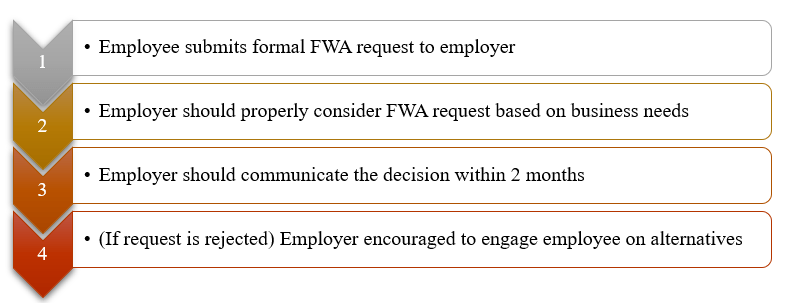Tripartite Guidelines on Flexible Work Arrangements: Singapore

Introduction
Singapore recently introduced mandatory guidelines on 16th April 2024 to streamline how employees request and employers handle Flexible Work Arrangements (FWAs).[1] These FWAs can include remote work, flexible hours, or compressed workweeks.[2] The goal is to improve work-life balance for employees, especially caregivers, and give employers an edge in attracting and retaining talent.
These guidelines replace previous recommendations and establish minimum requirements for employers. While employers have the final say on approving FWAs, the guidelines emphasize clear communication and a supportive work environment. Resources will be available for both employers and employees to navigate the FWA request process. With the support of the Tripartite Alliance for Fair and Progressive Employment Practices (TAFEP) and the Ministry of Manpower (MOM), these Guidelines signify a significant step towards fostering harmonious and adaptable workplaces in Singapore.
This article will provide an overview of these guidelines in the following manner:
- Understanding FWAs
- Formal FWA Requests: Requirements and Principles
Table of Contents
Understanding FWAs
Singapore’s government accepts all 10 recommendations from the Tripartite Workgroup on FWA Requests, emphasizing the importance of establishing clear norms and expectations.
- Effective Date: The mandatory Guidelines will come into effect on December 1, 2024, with employers expected to adhere to them. The Guidelines aim to simplify the process for employees to request FWAs while respecting employers’ decision-making authority.
- Workgroup Formation: Convened in September 2023, the Tripartite Workgroup comprised representatives from various stakeholders, including employees, employers, and HR professionals. Their consultations emphasized the necessity of communication and trust for effective FWAs.
- Guidelines Overview: The Guidelines detail the formal process for requesting FWAs, how employers should consider such requests and the importance of transparent and timely communication regarding decisions.
- Educational Approach: The Workgroup recommends an enabling and educational strategy for implementing the Guidelines, ensuring both employees and employers have the necessary resources and skills to navigate FWA requests. Assistance is available through the Tripartite Alliance for Fair and Progressive Employment Practices.
- Implications: The Guidelines aim to enhance work-life harmony, talent attraction, and retention, fostering more inclusive and productive workplaces.
Types of FWAs
FWAs have broadly been categorized as follows:
- Flexi-Place (Work Location): Employees have the flexibility to work from various locations beyond their traditional office setting. This could include remote work from home, co-working spaces, or satellite offices.
- Flexi-Time (Work Timing/Duration): Employees have the flexibility to adjust their work hours within a certain timeframe while maintaining their total work hours and workload. This allows employees to accommodate personal schedules or preferences, such as starting and ending work earlier or later.
- Flexi-Load (Work Scope): Employees have the flexibility to manage their workload and responsibilities, with variations in the amount of work assigned and corresponding remuneration. This could involve part-time arrangements, job sharing, or phased retirement options, allowing employees to balance work commitments with other life priorities.
Formal FWA Requests: Requirements and Principles
Summary of Recommendations on FWA Requests
The 10 recommendations made for Tripartite Guidelines on FWA Requests are as follows:
- Clear Workplace Norms: Establish clear workplace norms regarding FWA requests and considerations, managing expectations for both employees and employers while allowing room for progressive practices.
- Process Guidance: Provide guidance on the process of requesting and considering FWAs, focusing on the process rather than the outcome of requests.
- Responsible Requesting: Encourage responsible FWA requests from employees and proper consideration from employers based on business grounds.
- Formal Requests: Apply guidelines to formal FWA requests, defined as documented requests containing necessary information for informed decisions.
- Coverage: Extend coverage to all employees, post-probation, with probation duration determined by employers.
- Exclusion of Jobseekers: Exclude FWA requests from jobseekers but allow employers to state the FWA approach in job advertisements to manage expectations.
- Small and Medium Enterprises (SMEs) Inclusion: Include all employers, including SMEs, providing guides and templates for compliance.
- Educational Approach: Implement an educational approach to equip employees and employers with the necessary skills and resources for FWA requests.
- Communication and Engagement: Strengthen communication to help employers understand the benefits of FWAs and raise awareness of available options, replacing previous Tripartite standards.
- Support for Employers: Provide support for building FWA implementation capabilities, scaling up resources and training in partnership with business associations and unions, customized for different sectors and firm sizes.
Submitting Formal FWA Requests

- Eligibility:
- All employees who have completed probation, duration as determined by the employer, can make formal FWA requests under the Guidelines.
- Employers have the option to state their FWA policy or approach in job advertisements and interviews to manage job seekers’ expectations.
- Submission Process:
- Employers should establish a process for employees to submit formal FWA requests, such as through a work portal or via email to their supervisor.
- Requirements for Request Submission:
- If the employer specifies requirements for making a formal FWA request, employees must follow these requirements.
- In the absence of stipulated requirements, employees may submit a written request including:
- Date of the request
- FWA requested with expected frequency and duration
- Reason for the request
- Requested start and end dates if applicable
- A sample template in Annex A can be used for guidance.
- Compliance:
- Requests not meeting the requirements outlined are not considered formal requests under the Guidelines.
- Additional Information:
- Employers are encouraged to provide information to help employees assess their suitability for FWAs, such as types of FWAs available, reasons for potential request rejection, and expectations for FWA use.
- Employers can refer to www.tafep.sg for a sample FWA policy and customize it according to their needs.
Considering Formal FWA Requests
- Guideline Reference: Employers should adhere to the Guidelines when handling formal FWA requests from employees.
- Open Discussion: Employers and employees are encouraged to engage in open and constructive discussions regarding FWA requests. Mutual agreement should be sought to meet both organizational and employee needs. Disagreements should be addressed through internal grievance procedures or union assistance for unionized employees to maintain a harmonious workplace.
- Proper Consideration: Employers should thoroughly consider FWA requests, focusing on job-related factors and potential impacts on business and employee performance. Resources on assessing FWA requests are available at www.tafep.sg.
- Reasonable Rejection Grounds: Employers have the right to reject FWA requests based on reasonable business grounds, such as:
- Significant cost increase.
- Detrimental effect on productivity or output.
- Feasibility or practicality issues related to job role or organizational capacity.
- Unreasonable Rejection Grounds: Employers should not reject FWA requests for reasons unrelated to business outcomes, such as:
- Personal biases against FWAs.
- Preference for direct supervision in the office.
- Organizational traditions or customs against FWAs.
- Resource Reference: Annex B provides an example of how employers could respond to a formal FWA request, offering practical guidance for handling such requests.
Communicating the Decision
- Timely Communication:
- Employers must provide a written decision within two months of receiving a formal FWA request.
- This timeframe includes engaging in clarifications, discussions, and communicating the approval or rejection of the request.
- Reasons for Rejection:
- If the request is rejected, employers should clearly state the reason for rejection in the written decision.
- Discussion of Alternatives:
- Employers are encouraged to explore alternative solutions with the employee(s) if the FWA request is rejected.
Principles for Proper Consideration of FWA Requests
- Employee Responsibility: Employees should request and use FWAs responsibly, considering the impact on their workload, performance, team, and clients if relevant to their role.
- Employer Reasonability: Employers should explore accommodating FWA requests, if reasonable, by reviewing work processes or redistributing tasks among team members to ensure client needs are met and maintain productivity to the extent reasonably practical.
- Case-by-Case Evaluation: Each FWA request should be evaluated individually, considering its viability from a business perspective. Employers are not expected to approve the same FWAs concurrently for all employees if valid business grounds exist.
Conclusion and Looking Forward
Singapore’s mandatory FWA guidelines aim to create a clearer and more balanced approach to flexible work arrangements. The emphasis on open communication, responsible behaviour, and reasonable considerations from both employers and employees is a positive step towards fostering a win-win situation. While the guidelines offer a framework, future success will depend on ongoing education, support for employers, and building a culture of trust in workplaces across Singapore.
[1] https://www.mom.gov.sg/-/press-releases/2024/tripartite-guidelines-on-flexible-work-arrangement-requests.pdf
[2] https://www.mom.gov.sg/newsroom/2024/0416-launch-of-tripartite-guidelines-on-fwa-requests-and-tripartite-workgroup-reports
King Stubb & Kasiva,
Advocates & Attorneys
New Delhi | Mumbai | Bangalore | Chennai | Hyderabad | Mangalore | Pune | Kochi | Kolkata
Tel: +91 11 41032969 | Email: info@ksandk.com
By entering the email address you agree to our Privacy Policy.